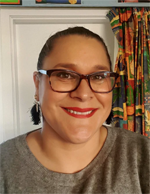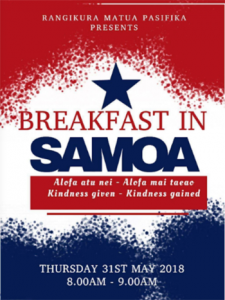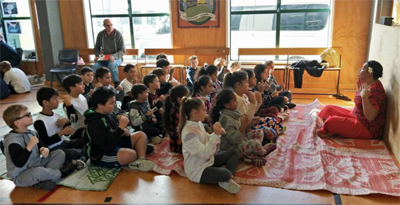Rangikura School is a full primary in Ascot Park, Porirua. During Samoa Language Week the staff, students, parents, and wider community came together to enjoy an array of activities and celebrations which were organised by the school’s Rangikura Matua Pasifika Parent group.
Assistant principal, Amanda Williams, explains the work of Rangikura Matua Pasifika in leading learning at their school.
What is Rangikura Matua Pasifika?
Rangikura Matua Pasifika is a group of staff, parents, and āiga (families) who have a vision to raise Pasifika achievement at our school through support and partnership. Our Rangikura Matua Pasifika group started slowly but, with continued support and perseverance, it has become stronger over time.
The group is one of many initiatives linked to our school vision and community engagement goal of "Tamaiti Mua". Our school vision is "Home + School = Rangikura" which aspires for total collaboration and collective ownership in the education and wellbeing of our students. Our community engagement initiative "Tamaiti Mua" (children at the front, children first) seeks to build respectful and trusting partnerships with parents and whānau that ultimately put our tamariki first.
Although our school has always had a strong community feel, we saw a need to go one step further. We wanted proper engagement with our families; engagement that enabled our parents to drive learning in our school. Rangikura Matua Pasifika is helping us work toward this goal with our Pasifika āiga.
Community engagement principle
Rangikura Matua Pasifika is a great example of community engagement. Community engagement is about establishing strong home-school partnerships where parents, whānau, and communities are involved and supported in students' learning.
How is Rangikura Matua Pasifika involved in the life of the school?
We hold regular talanoa with our Matua Pasifika Parent group to work out the direction that our parents of Pasifika learners want to go. We set collective goals and discuss opportunities to work together to support the learning of our students.
Earlier in the year, we discussed ways that we could celebrate Samoa Language Week as a school community and our Matua Pasifika group took over the direction and made the event their own. Samoa Language Week at our school was packed with celebrations and activities that were totally community led. Our teachers only needed to provide support and enjoy what was on offer.
The success of Samoa Language Week has inspired our Matua Pasifika group to use the same framework for future Pasifika language weeks. A school wide celebration of Cook Islands Māori Language Week has just taken place.
Rangikura Matua Pasifika have their own Facebook group with 86 current members. Facebook is used by the group to organise events, communicate information, share ideas, and seek assistance. If you require help or advice, you just post a request and the support is there. Social media plays a big role in our school in how we get hold of families, ask for help, and share things.
Community voice
The New Zealand Curriculum encourages schools to seek out and listen to the ideas of students, parents, whānau, and the wider community when designing their local curriculum. Rangikura School enables parents to shape and lead learning experiences that reflect their cultural values, knowledge, and aspirations.
What happened during Sāmoan Language Week?
School wide rotations
All classes rotated through a range of workshops which were led by our Gagana Samoa Faiaoga (teacher) and Matua Pasifika parents. The aim of the workshops was to share and celebrate the language and culture of Samoa. Workshops included:
- Aganu’u Samoa (culture): Students listened to a local tusitala (Samoan storyteller) as he explained the ava ceremony
- Siva Samoa (dance): An aunty came to school to teach the siva Samoa (a Samoan dance)
- Valuga Popo (food): Students learned how to valuga popo (scrape the coconut)
- Koko Samoa (drink): Students made koko Sāmoa (cocoa drink) from scratch
- Pese Samoa (song): Students learned a simple pese Samoa (Samoan song)
- Ula lole (celebratory custom): Students made a ula lole (lolly necklace) and learnt about this tradition.
In class support
Teachers were offered ideas on what learning they could do in their classes during Samoa Language Week and parents came to school to support. Faioga Lisa Fanueli-Wesche, our Gagana Samoa teacher who runs our Samoa language nest and supports our school Poly club, was available to go into classrooms to help both teachers and students with language learning, songs, and cultural activities.
The year 3 and 4 syndicate ran their own rotation of activities including singing and dance. The year 1 and 2 children also enjoyed a variety of activities with the support of one student’s tinamatua (Nana) who visited the school to help students learn the Samoan alphabet and songs, make siapo art, and thank you cards in Gagana Samoa.
Community breakfast
The Matua Pasifika group hosted a Samoan breakfast on the Thursday morning of Samoa Language Week. This event was for all of our tamariki and families, not just our students and families from Samoa. It brought everyone in the community together to celebrate the beautiful culture and language of Samoa. Kokolaisa (cocoa rice) and other favourite dishes were on the menu.
Celebrational assembly
The Rangikura Matua Pasifika Parent group finished off the week by organising a special Friday assembly with honoured guests, the High Commissioner of Samoa, H.E Le Afioga Papali'i Leasi Scanlan, and his wife Mrs Joyce Scanlan. The assembly celebrated 56 years of Samoan independence and included speeches, dancing, and songs.
It was really lovely to see some of our old students who now attend high school come back to support us during Samoa Language Week. They helped with our breakfast and danced at our assembly to support our students. That’s testimony to the strong sense of community and belonging that our school fosters. Once you leave us, it isn’t the end. You are always a part of us and you are always welcome back.
What impact has the collaboration with Pasifika āiga had at your school?
Through the work of Rangikura Matua Pasifika all of our students are exposed to a range of Pasifika languages and cultures, which helps them better understand our multicultural community and value diversity.
Our Pasifika children develop a huge sense of pride and self belief when they see their language and culture celebrated and nurtured at school. Because our curriculum is responsive to the culture, values, and identity of our local community, our students are given the message that they are important and that their culture counts.
“Having family come into the classroom and share about culture has given the kids a real opportunity to learn something new and for some has made them realise that their learning outside of the school brings real value to the skills they are developing inside the classroom.”
Maria Uluilelata, BOT member, parent, and member of Rangikura Matua Pasifika
“It's really fun and other people get to express their culture. We get to learn about other languages.”
Damon Junior Rongotaua (Year 5 student)
Cultural diversity principle
Rangikura School offers a culturally rich local curriculum that incorporates students' cultural identities and values into teaching and learning programmes.
Our Pasifika āiga have a greater sense of belonging at our school. They have a voice and a role in the education of our children. Many of our Pasifika parents seem much more comfortable coming into school. Of course it is still a journey and there is still much more work to be done. But we are definitely breaking down barriers.
Pasifika student achievement continues to improve which we think is a direct outcome of our strong partnership for learning with our Pasifika families.
What’s next for the school?
We want to continue to work in partnership with our Matua Pasifika Parent group and support their ongoing contribution to the direction of learning at our school. We also want to build closer and deeper relationships with all of our families, especially our Māori whānau.
Following on from the success of the Rangikura Matua Pasifika Parent group, our school has established Whānau Māori o Rangikura, a group of staff, parents, and whānau who are committed to Māori achieving success as Māori. This group meets regularly and has a Facebook community to work out the direction for learning for our Māori students.
It isn’t just about learning te reo Māori, it’s about integrating te ao Māori, the Māori worldview, into our curriculum.
We have recently completed a school wide inquiry into Matariki where each class explored a different aspect. With the support of Whānau Māori o Rangikura, we held a Matariki celebration evening for the entire school community where students showcased their learning and we shared soup and had a bonfire.
Our school vision of "Home and School = Rangikura" drives what we do. Establishing collaborative and collective partnerships between staff, parents, and the wider community is something that we always strive towards. Relationships need constant care. We are proud of where we have come but we still have work to do.
Have you seen?
Samoa Language Week
Our events page is packed with ideas on how you can celebrate Samoa Language Week at your school. Check it out!
Community engagement starter survey
This survey helps you consider how you are currently enacting the community engagement principle at your school, and what your next steps may be.
Engaging Pasifika parents and communities
This section of the Pasifika Education Community offers resources, tools, and examples to help your school effectively engage with your Pasifika communities.
Related stories in our media gallery
Engaging Pasifika families – Owairaka School builds a fale
The staff at Owairaka School have explored ways to build deep connections and partnerships with the many cultural groups and families at their school. Principal Diana Tregoweth and her staff went on a professional development trip to Samoa to help them to understand the culture of their Samoan students. This story tells how the community subsequently worked together to bring an element of Samoan culture to the school in the construction of a traditional fale.
Community engagement – a parent's perspective
Saga Frost, a parent at Owairaka School, discusses what it is like to be a partner in the learning community at her school and reveals that she didn't realise, until she got involved, how much she could impact on her child's learning.
- Tags:
- community engagement
- cultural diversity
- primary
Return to top






